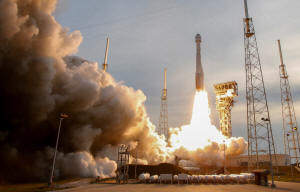Boeing Starliner capsule nears completion of pivotal test flight to
orbit
 Send a link to a friend
Send a link to a friend
 [May 25, 2022] By
Steve Gorman [May 25, 2022] By
Steve Gorman
(Reuters) - The new Boeing Starliner
capsule was due to descend back to Earth on Wednesday from its first
uncrewed journey to the International Space Station (ISS), completing a
high-stakes test flight as NASA's next vehicle for carrying humans to
orbit.
Less than a week after its launch from the Cape Canaveral U.S. Space
Force Base in Florida, the CST-100 Starliner was scheduled to
autonomously undock from the space station at 2:36 p.m. EDT (1836 GMT)
to embark on a five-hour-plus return flight.
If all goes as planned, the mission finale will come with the
gumdrop-shaped craft making a fiery atmospheric re-entry followed by an
airbag-cushioned parachute landing on the desert floor near White Sands,
New Mexico at 6:49 p.m. PDT (2249 GMT).
Starliner was lofted to orbit last Thursday atop an Atlas V rocket
furnished by the Boeing-Lockheed Martin joint venture United Launch
Alliance and achieved its main objective, a rendezvous with the ISS,
despite four of its multiple onboard thrusters malfunctioning along the
way.

Boeing engineers also had to improvise a workaround for a thermal
control defect during the final approach of the capsule to the space
station, orbiting some 270 miles (430 kilometres) above Earth.
But NASA and Boeing officials said none of the problems encountered so
far should preclude Starliner from safely returning, and they chalked up
such snafus to the learning process of developing a new spacecraft.
A successful mission would move the Starliner, beset by repeated delays
and costly engineering setbacks, a major step closer to providing NASA
with a second reliable avenue for ferrying astronauts to and from the
space station.
Since resuming crewed flights to orbit from American soil in 2020, nine
years after the space shuttle program ended, the U.S. space agency has
had to rely solely on Falcon 9 rockets and Crew Dragon capsules from
billionaire Elon Musk's private company SpaceX.
[to top of second column]
|

Boeing's CST-100 Starliner capsule launches aboard a United Launch
Alliance Atlas 5 rocket on a second un-crewed test flight to the
International Space Station, at Cape Canaveral, Florida, U.S. May
19, 2022. REUTERS/Steve Nesius

Previously the only other option for reaching the
orbiting laboratory was by hitching rides aboard Russia's Soyuz
spacecraft, an alternative currently less attractive in light of
heightened U.S.-Russian tensions over the war in Ukraine.
Much is also on the line for Boeing, as the Chicago-based company
scrambles to climb out of successive crises in its jetliner business
and space-defense unit. The Starliner program alone has cost the
company nearly $600 million over the past 2 1/2 years.
An ill-fated first orbital test flight of Starliner in late 2019
nearly ended with the vehicle's loss following a software glitch
that effectively foiled the spacecraft's ability to reach the space
station.
Subsequent problems with Starliner's propulsion system, supplied by
Aerojet Rocketdyne, led Boeing to scrub a second attempt to launch
the capsule last summer.
Starliner remained grounded for nine more months while the two
companies sparred over what caused fuel valves to stick shut and
which firm was responsible for fixing them.
The do-over test mission winding up on Wednesday could pave the way
for Starliner to fly its first astronaut crew to the space station
as early as the fall, NASA has said.
The orbiting outpost is currently home to a crew of three U.S. NASA
astronauts, an Italian astronaut from the European Space Agency and
three Russian cosmonauts.
(Reporting by Steve Gorman in Los Angeles; Editing by Bradley
Perrett)
[© 2022 Thomson Reuters. All rights
reserved.]
This material may not be published,
broadcast, rewritten or redistributed.
Thompson Reuters is solely responsible for this content.
 |